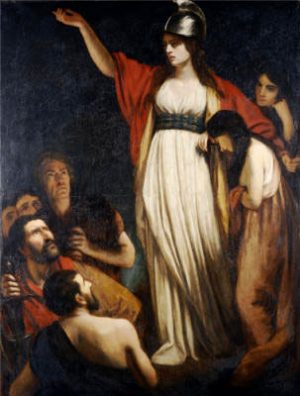Boudica was a queen of the Iceni, a Brittonic tribe who lived in what is now eastern England. She was also known as Boudicca in the UK, Boadicea or Boudicea in the US, and Buddug in Wales. In AD 60 or 61, she led an uprising against the Roman Empire, which had conquered her homeland some years earlier. Thanks to her fierce determination and brave fight against a much stronger enemy, Boudica’s story has been remembered throughout history.
Background
Boudica was the wife of King Prasutagus, the ruler of the Iceni tribe. When the Romans started their conquest of southern Britain in AD 43, Prasutagus allied his tribe with them. This alliance allowed the Iceni to keep their lands and remain a free people. He even assisted the Romans during the revolts of AD 47 and 48. In his will, he left half of his wealth to his two daughters and the other half to Emperor Nero, thinking that this would ensure the Iceni’s continued independence.
However, when Prasutagus died in AD 60 or 61, Nero annexed the Iceni lands and made them a Roman province. The Romans also stripped the tribe of its wealth and status. Boudica was flogged, and Roman soldiers raped her daughters. Enraged by the treachery and mistreatment, Boudica led her people in a rebellion against the Romans.
Uprising Against the Romans
When Governor Gaius Suetonius Paulinus was away leading a campaign in Wales, Boudica led her people in an uprising against the Romans. The Iceni were joined by other tribes, including the Trinovantes. Together, they attacked the Roman colony of Camulodunum (modern-day Colchester), which was home to many retired Roman soldiers. The Romans were caught off guard, and the city was sacked. A bronze statue of Nero was decapitated, and the head was taken as a trophy.
The rebels then moved on to Londinium (modern-day London), which was a thriving Roman commercial center. When Suetonius Paulinus heard of the rebellion, he rushed back to Londinium with his troops. However, he decided that it was not worth risking a battle against the rebels and evacuated the city instead. Londinium was again sacked and burned, and its inhabitants who weren’t able to evacuate were killed.
Boudica and her allies then headed for Verulamium (modern-day St. Albans). However, before they could reach the city, Suetonius Paulinus met them in battle somewhere along the Roman road with an army of about ten thousand men. The Roman army was heavily outnumbered by Boudica’s troops which were said to have been in the hundreds of thousands.
The battle was fierce, but ultimately, the Romans were better trained and equipped. Both sides had no interest in taking prisoners, and historians believe that over eighty thousand people were killed in the three settlements that were destroyed. Emperor Nero was alarmed by the revolt that he considered withdrawing all Roman troops from Britain. However, the rebellion was eventually crushed. Suetonius Paulinus was able to restore Roman control over the province, and the Roman occupation of Britain continued. Boudica was said to have committed suicide by poison, although some accounts claim she fell ill and died of natural causes.
Boudica’s Legacy
Although she was defeated, Boudica’s story has been remembered through history not only as an example of courage and defiance against tyranny and oppression but also of the power women were capable of. Centuries after her death, she has become a British folk hero and an inspiration to those who fight for freedom. Boudica’s story has also been popularized in books, films, and television shows.
